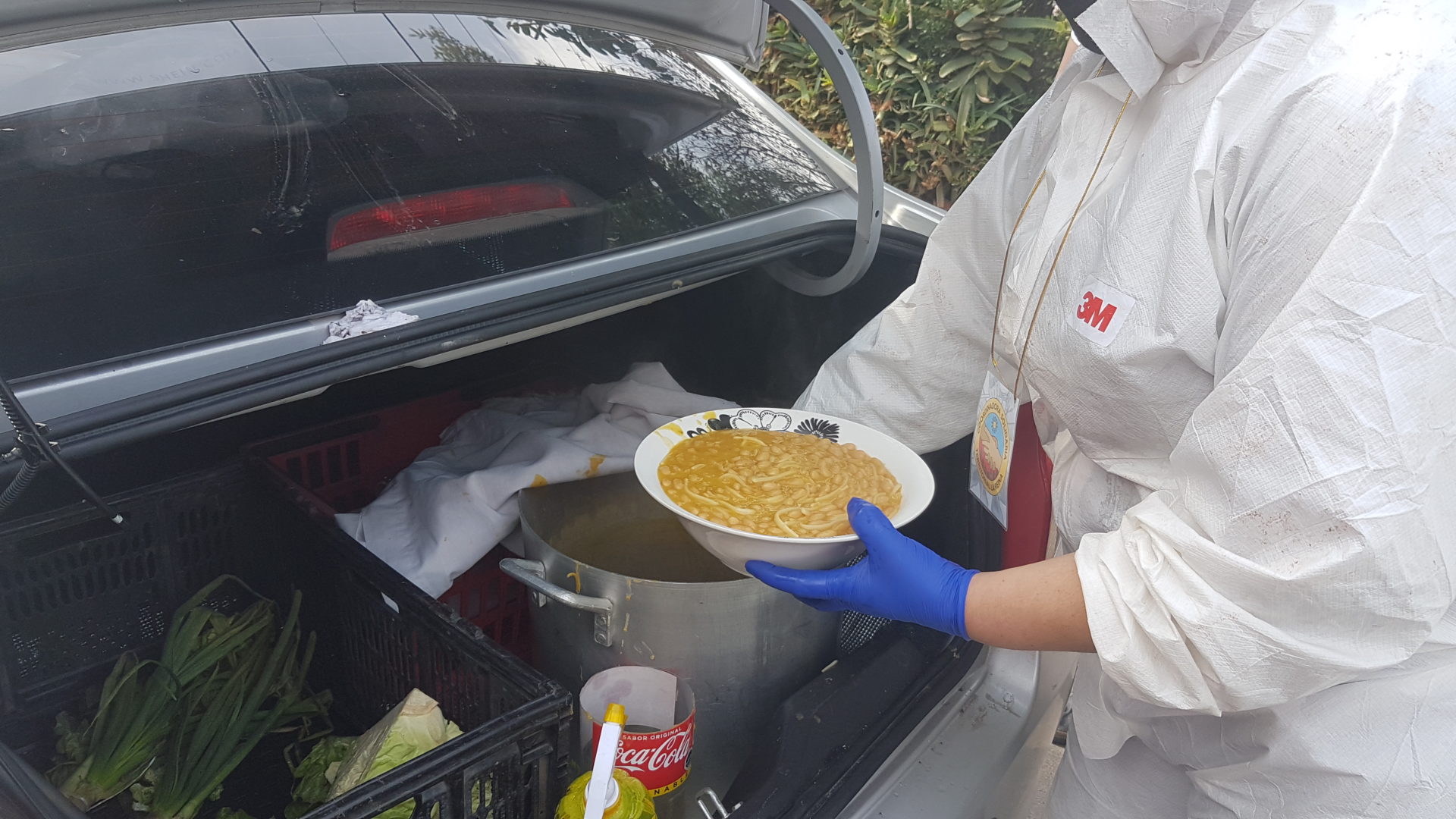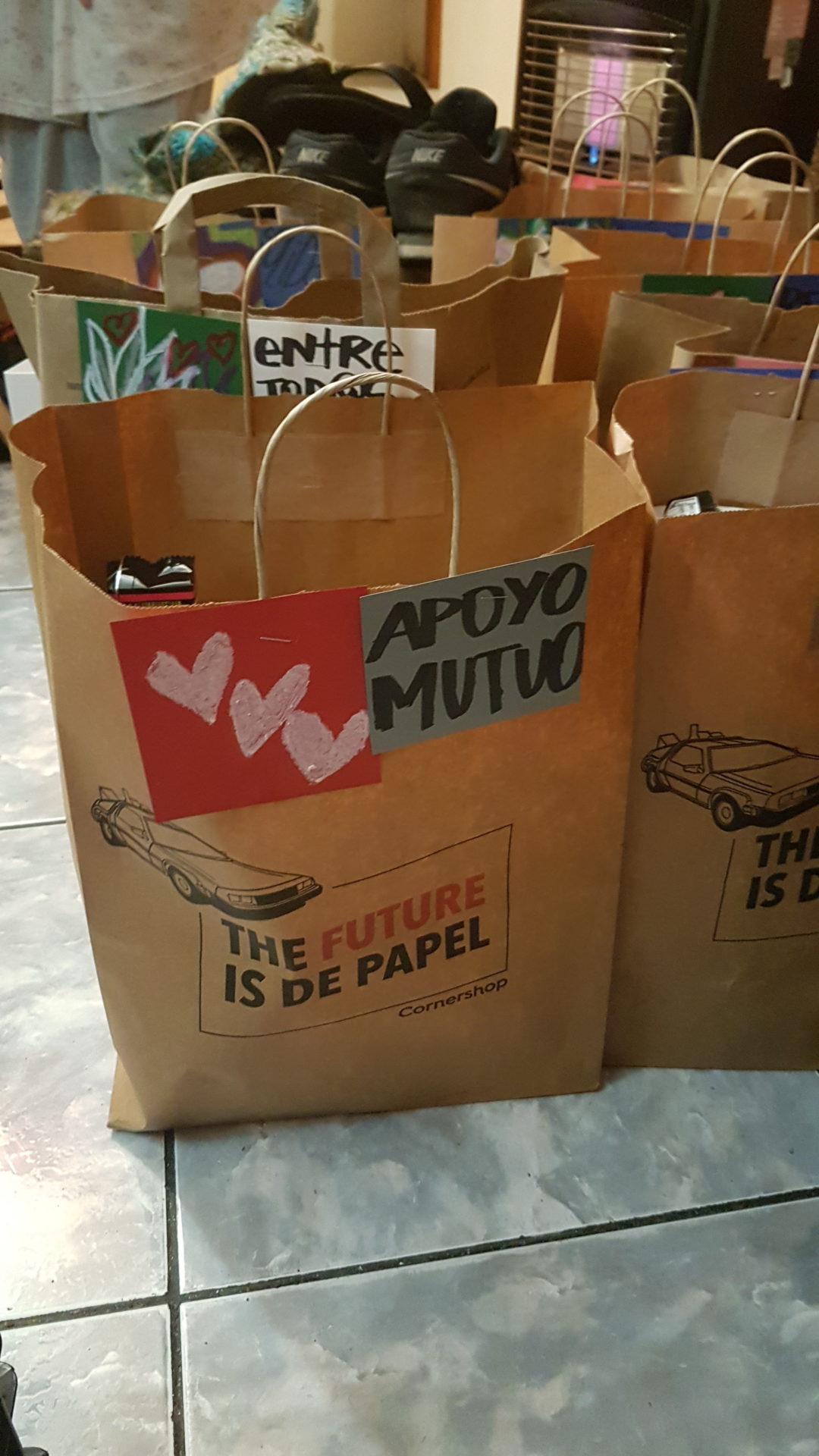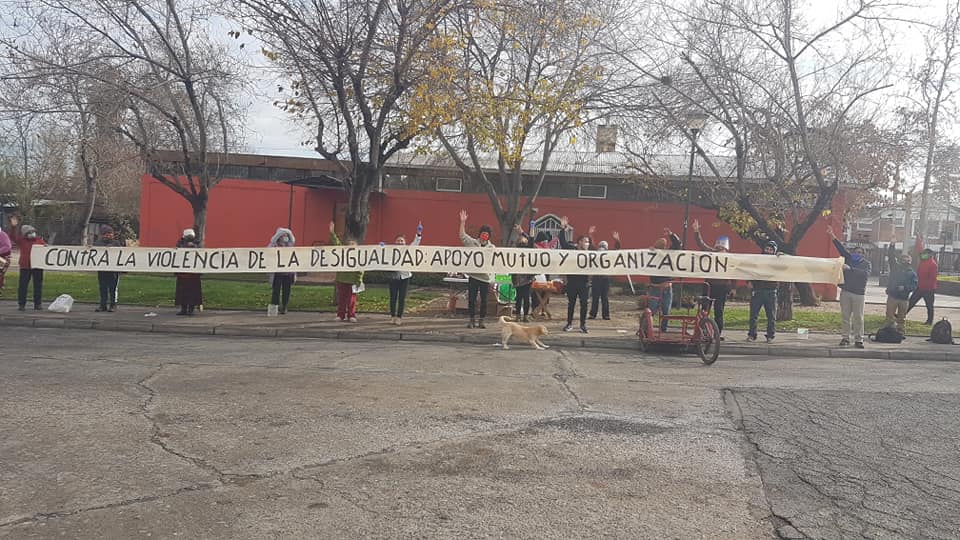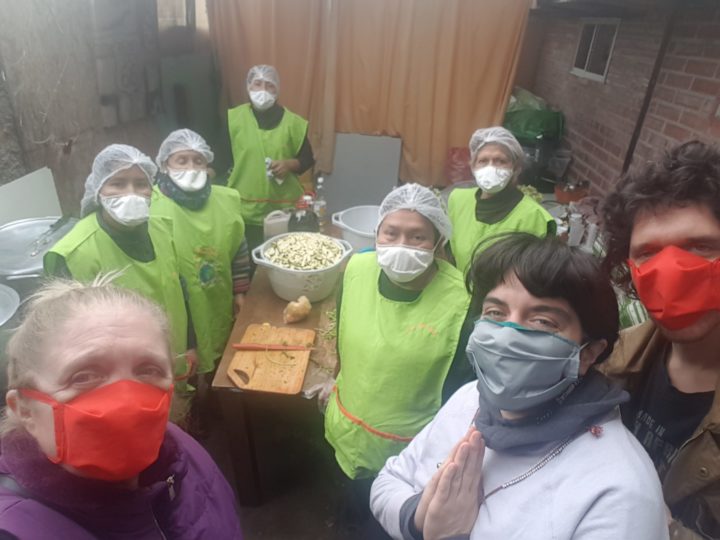We interviewed humanist actress Paulina Hunt, who in mid march, when the Coronavirus confinement started in Chile, joined a network of neighbors in the La Reina commune. The amount of solidary activities kicked off by this network stand out as proof of what self-organizing can do for people in order to help each other in catastrophes such as this one, as they try to counteract the patent cruelty of our current system.
Pressenza: The pandemic in Chile has left the social and economic fragility of wide sectors of the population in the open . You’ve been working as a volunteer for the Las Campanas Plaza in La Reina, one of the most well-off communes in Santiago. Can you comment to Pressenza and our international readers on what is it that you do? How do you do it? Since when? Why and what for?
Paulina Hunt: First of all, I would like to thank you for this interview and for the opportunity to talk about my experience. I should also say that the terms “you” and “me” just don’t cut it, because one of the most important experiences as of today has been to live the “us”. We’re not just a part of a solidary network, but also of a network of ever multiplying necessities. It is difficult to describe at the moment, because it has no precedent. If you look for something in your personal memory, there’s nothing similar. You need to go to historical memory, where stories of crisis, war and economic depressions… echo in part what we’re living right now.
Today, there’s thousands of people in the Commune who have nothing to eat. Therefore, a solidary network was created, with multiple ways of contributing, multiple and complex tasks, as well as multiple ways to deliver the aid. There’s the handout of meals in the Las Campanas Plaza, which is ever growing in number (yesterday it was 150 people who received food), there’s the community soup-kitchens, where the neighbors go to receive their meals, and some travel corners and passages with the pot in the car’s trunk, delivering meals directly to the neighbors’ homes, including those with Covid. Food baskets are also delivered to specific neighbors who are in dire need and cannot come out of their houses for diverse reasons (older people, people with limited mobility, disabled or small children). Only in the field can we “see” and “measure” the diversity of the human situations. They’re a unique and concrete experience that cannot be translated to statistics.

This action has gone for three months and is coordinated and structured on a weekly basis, polishing and widening the organization. There’s also the donors, who are fundamental in order for this to happen. EVERYBODY can contribute.
And there’s something that must be highlighted: the thousands of micro stories of love, compassion and solidarity that deliver an overwhelming humanity to this social fabric. Hundreds of friends who give, contribute and push for creativity and love so that the “thing” keeps on going.
Pressenza: What has been the reception you’ve found on the people, their situation, their needs, their expectations?
Paulina Hunt: There’s the silent reception of those who, for the first time, find themselves with nothing to eat.
The joyful, fun attitude of men and women of the “streets”, for whom their only chance to have a meal is to attend to the solidary handout. The tense and sometimes elusive look of embarrassment, fear and cold. The laughter of the work teams. The moving tenderness. The pain, the despair. Above all, the despair of the neighbors. The gratefulness.
There’s that, regarding those who are presently receiving help. In the case of those who give the help, it’s visible how solidarity and giving to others showcases itself as the most valid path. I hope it transforms for many into a lifestyle where “it’s worth more to give than to receive”.
Regarding expectations, I don’t think we can summarize them in just one, I still don’t think there’s one great common expectation across the Commune… which would be wonderful, but I haven’t sensed that as of yet… There’s those who “want this to beover already”, who “hope (they) don’t catch the Covid”, who want to “return back to normal”, etc. And the other expectation that many of us in the network share is the “urgency for a change of system”. This neoliberal system, whose central value is money and the economy… it’s spent. It’s an embarrassment. We recognize that this system is reflected in a cruel society and within each person as a system of beliefs.
Pressenza: How much longer do you think you’ll be able to handle this activity?
Paulina Hunt: This activity exists out of the current need, therefore it won’t stop until the need is resolved, whatever this affirmation may mean. Today, it may be this network that fights against hunger, tomorrow it may be a network that articulates the urgent changes in the country. In this action, what is projected is solidarity and what lies behind is the organizing of the neighborhood.

Pressenza: How do you see the immediate future of our country once the critical part of the pandemic is over?
Paulina Hunt: Huge question. Many visions roll and stumble around my conscience: the crude vision of reality, the vision of hope and longing, the vision of fatalism, the global vision, the political vision, the government’s vision, the media’s vision…
I choose that of hope and longing for a profound change. From there, I feel that a giant step towards transformation is underway, that no one will be able to stop change, that once the pandemic’s critical point is over we will fill the streets with demands, that we shall advance towards a Sovereign Constitutional Assembly so it’s the sovereign people who decides what type of society does it want. How do we want to live, and under what conditions do we want to live. Clearly it isn’t the conditions we currently live in, not even remotely.
I know that vision isn’t yet established in all hearts, and I sincerely hope that the solidarity that gives light to this crude and cruel winter we’re living in illuminates more consciences, so they can understand that if we do not change our system of beliefs and the system of life that has taken us here, this will be a mess. And that, on the contrary, if we understand the necessity for transformation, this dark episode in our history can be a great opportunity. An opportunity to reconstruct the social fabric, to understand that we are one with the environment, to live the experience of others, to affirm that it is the human being that moves the world and not the economy, and that we need each other… that development, extractivism, and exploitation has a limit. And that we have the power.
Pressenza: Would you like to say something else, share another reflexion or send a message to our readers?
Paulina Hunt: Yes, to give thanks for being part of this network. And to publicly appreciate the volunteering of the hundreds of neighbors that push this action. A work that’s not bereft of difficulties and challenges, in which we’ve also tried to contribute through a hard look within ourselves, to the depths of each one’s existence. Trying to refresh day by day that in each action there’s the possibility of making a human mistake or repeating faultily learned mechanisms. Something like the simultaneous personal and social transformation as proposed by Humanism.
We acknowledge the passionate voluntary work of the Plaza Las Campanas Community, formed by Minerva, Sandra, Rodrigo, among many more. The Violeta Parra Cultural Center, of the Villa, with María Paz Edson and many. The Alegria de Niñxs soup kitchen where Milagros is in, who really does wonders with her team of women in order to deliver 210 daily lunches. The La Reina Solidary Territorial Coordinator with Fresia, Pedro, Cecilia and tenths of friends. Sandra and her daughter Karin in the La Reina Village, the kids from the Sports and Cultural Centre AWKA, the Amado Nervo Council, The Altatierra Community, Loreley’s neighbors, AKOPIO RESISTENCIA, where we coordinate deliveries for many soup kitchens, and all the friends who support with money and kind (most of them sustainedly). To Ester, Constanza, Marta, the women who weave and contribute with their creations. Virginia with her tomato sauce, Regula with her quince dessert, Don Chucho, who from his precarity teaches us solidarity. To social organizations who anonymously collaborate, as well as some political organisations. There’s tenths of contributions behind Adriana, Felipe, me and everybody in the Solidary Baskets. To those who sell us their products with solidary prices for the contributions, to those who donate baskets… to those who help with the transport, to the neighbors who do sandwiches to hand out to the people as they wait in rows in the cold, and especially to those who say “don’t give me this week because I’m already covered, offer it to someone who needs it more today”.
And as we finish this interview, I am moved as I gain consciousness of what I say, and feel/think that if only we could be able to give testimony of the tremendous reality of just one commune…There’s not enough imagination to think of what’s happening in the rest of the city, the country and all of Latin America. Both regarding the HUNGER, as well as the answer of the organized people.

Pressenza: How do you see the immediate future of our country once the critical part of the pandemic is over?
Paulina Hunt: Huge question. Many visions roll and stumble around my conscience: the crude vision of reality, the vision of hope and longing, the vision of fatalism, the global vision, the political vision, the government’s vision, the media’s vision…
I choose that of hope and longing for a profound change. From there, I feel that a giant step towards transformation is underway, that no one will be able to stop change, that once the pandemic’s critical point is over we will fill the streets with demands, that we shall advance towards a Sovereign Constitutional Assembly so it’s the sovereign people who decides what type of society does it want. How do we want to live, and under what conditions do we want to live. Clearly it isn’t the conditions we currently live in, not even remotely.
I know that vision isn’t yet established in all hearts, and I sincerely hope that the solidarity that gives light to this crude and cruel winter we’re living in illuminates more consciences, so they can understand that if we do not change our system of beliefs and the system of life that has taken us here, this will be a mess. And that, on the contrary, if we understand the necessity for transformation, this dark episode in our history can be a great opportunity. An opportunity to reconstruct the social fabric, to understand that we are one with the environment, to live the experience of others, to affirm that it is the human being that moves the world and not the economy, and that we need each other… that development, extractivism, and exploitation has a limit. And that we have the power.
Pressenza: Would you like to say something else, share another reflexion or send a message to our readers?
Paulina Hunt: Yes, to give thanks for being part of this network. And to publicly appreciate the volunteering of the hundreds of neighbors that push this action. A work that’s not bereft of difficulties and challenges, in which we’ve also tried to contribute through a hard look within ourselves, to the depths of each one’s existence. Trying to refresh day by day that in each action there’s the possibility of making a human mistake or repeating faultily learned mechanisms. Something like the simultaneous personal and social transformation as proposed by Humanism.
We acknowledge the passionate voluntary work of the Plaza Las Campanas Community, formed by Minerva, Sandra, Rodrigo, among many more. The Violeta Parra Cultural Center, of the Villa, with María Paz Edson and many. The Alegria de Niñxs soup kitchen where Milagros is in, who really does wonders with her team of women in order to deliver 210 daily lunches. The La Reina Solidary Territorial Coordinator with Fresia, Pedro, Cecilia and tenths of friends. Sandra and her daughter Karin in the La Reina Village, the kids from the Sports and Cultural Centre AWKA, the Amado Nervo Council, The Altatierra Community, Loreley’s neighbors, AKOPIO RESISTENCIA, where we coordinate deliveries for many soup kitchens, and all the friends who support with money and kind (most of them sustainedly). To Ester, Constanza, Marta, the women who weave and contribute with their creations. Virginia with her tomato sauce, Regula with her quince dessert, Don Chucho, who from his precarity teaches us solidarity. To social organizations who anonymously collaborate, as well as some political organisations. There’s tenths of contributions behind Adriana, Felipe, me and everybody in the Solidary Baskets. To those who sell us their products with solidary prices for the contributions, to those who donate baskets… to those who help with the transport, to the neighbors who do sandwiches to hand out to the people as they wait in rows in the cold, and especially to those who say “don’t give me this week because I’m already covered, offer it to someone who needs it more today”.
And as we finish this interview, I am moved as I gain consciousness of what I say, and feel/think that if only we could be able to give testimony of the tremendous reality of just one commune…There’s not enough imagination to think of what’s happening in the rest of the city, the country and all of Latin America. Both regarding the HUNGER, as well as the answer of the organized people.
Translated from Spanish by Ocatavio García Soto.






